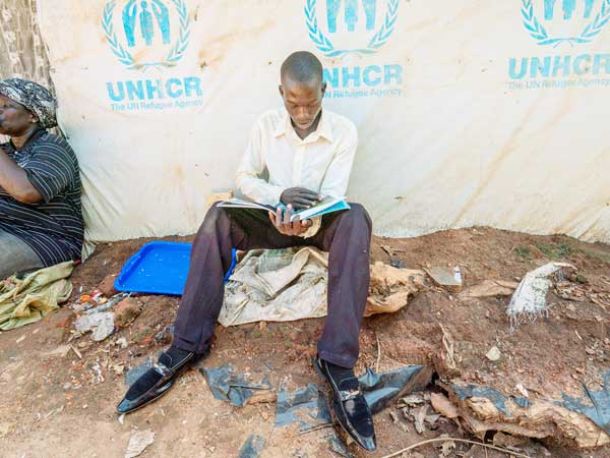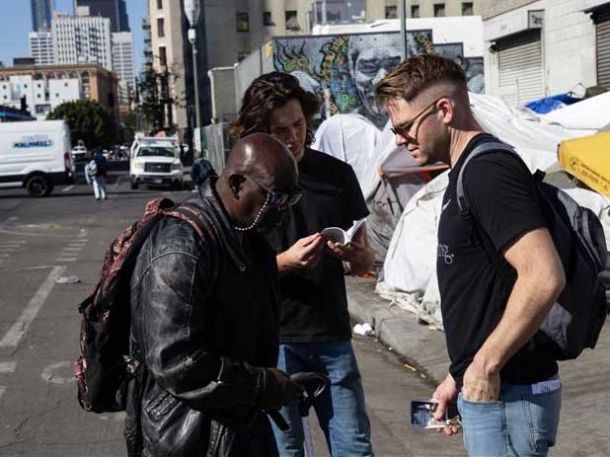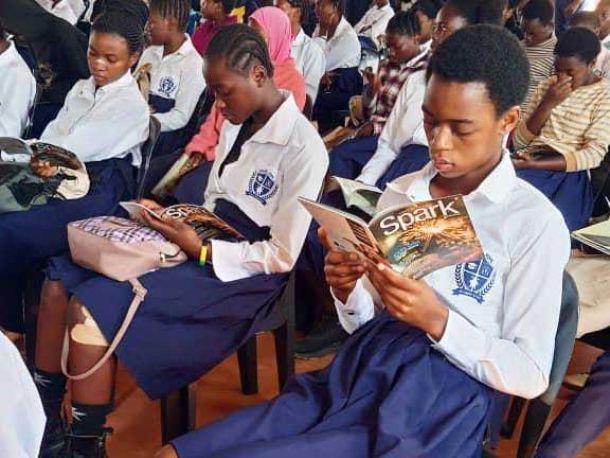Spiritual Food
In Uganda, if you’re going to be hungry at 1 pm, you ask to eat around 11 am. Expect a couple of hours—it’s a basic rule of thumb for any East African event. This is just one of the customs you pick up on as a western 'mzungu.'
I have spent many months living in Uganda, but it wasn’t until January on a GO (Gospel Outreach) Trip to Entebbe, that I recognized the cultural significance of this carefree attitude toward time. Funnily enough, I realized our approach to evangelism in Uganda was much like how we ate lunch there—hear me out.
Ugandans are extremely hospitable. Their wholehearted wish is to serve any visitor who sets foot on their doorstep, and the best way to do this is by providing them with a delicious meal. It is the expected responsibility of the host to have their fattest goat slaughtered and ripe fruit diced for the occasion. Juices must be squeezed, groundnuts properly roasted, and plantains freshly mashed. The guests must feel as though the finest foods were saved just for them. Consequently, the time it takes to cook the perfect meal on a tedious charcoal stove is of far less importance than its presentation.

It could have been easy for our team of antsy, time-bound mzungus to complain about the lack of punctuality of our midday lunch breaks. We could have grumbled or spoken harshly to the church representatives who prepared the meals.
Yet, rushing the prep time would have disrespected the cultural sentimentality around serving a proper traditional meal. Our team recognized that to stick to our plan would only be self-serving, and chose to be culturally sensitive to those serving Christ alongside us.
Each day, we patiently awaited the instruction of the church leaders—we let them lead us. Our group constantly expressed gratitude for the hospitality of each partner church and humbly ate beside the local members. It was an honour to share plates of delicious Ugandan cuisine with the godly people who welcomed us into their country.
This, in itself, was the most effective way to evangelize. Together.
Because we worked within the relaxed timeline of the Ugandan people, they felt respected and genuinely valued in their efforts serving with us. At the end of each day’s events, everyone left satisfied. The local Ugandans were blessed by new friendships formed and enthusiastic about more spiritual food to be shared ahead.
Sure enough, we have been overwhelmed by the incredible impact of the healthy relationships established with churches across the Entebbe region. Even months after the trip, we continue to receive messages from passionate Ugandan pastors who are fuelling a passion to bring more people into the family of Christ.
“We have brought fire to Entebbe,” said Pastor Onyango Godfrey, who pastors one of the expanding churches now equipped with training and Scripture resources. “Our center is on fire for evangelism; we are holding baptism classes for all the new converts. We can see the real moment of God in Entebbe. There is unity among the pastors and revival in every church.”
This revival has not ended with COVID-19. While the people of the Ugandan churches adapt to new ways of serving their local villages, they recognize that the gospel of Jesus Christ is the one thing that changes everything. We want to remain culturally compassionate by providing them with the best spiritual food, as they diligently feed their communities with His Word.
Although we might believe our western way of keeping time is ideal, God’s timing is incomprehensible—we have to trust His plan. Let me illustrate and conclude with this story from my own experience.
It was our first day of evangelism in the villages of Entebbe. Our GO Team had separated into two groups, and mine joined with a church called “Living Hope.” After morning worship, we set off in small teams of people from the United Kingdom, Canada, and Uganda to preach the Word throughout the surrounding villages.
I had the amazing help of 13-year-old Noel, a young “Living Hope” attendee, and Sidney, an English gentleman. What a blessing they both were! I learned a lot from the two of them. We all brought different strengths and used them for Jesus.
At the end of our afternoon together, Noel (pictured with Hope magazines) and I had heavy hearts as we said goodbye.
“Will we see each other again, Aunt?” she asked.
“I don’t think we will, Noel,” I said sadly. “But I will see you in heaven one day! ”
 Miles away, during our last day of evangelism, our team stopped to eat a late lunch. I scraped my plate, savouring the delicious taste of fresh cabbage, matoke (mashed plantains), and groundnut sauce, and got up to leave.
Miles away, during our last day of evangelism, our team stopped to eat a late lunch. I scraped my plate, savouring the delicious taste of fresh cabbage, matoke (mashed plantains), and groundnut sauce, and got up to leave.
Suddenly, from a crowd of noisy children, a voice shouted, “Aunt Emma!” There stood Noel, the beautiful 13-year-old evangelist who had befriended me eight days earlier! She’d happened to notice me eating by the church window. As it turned out, she was simply walking to a store with a friend who lived in the area. It was such a joyous reunion, and we hugged for a long time. God is full of timeless surprises!


